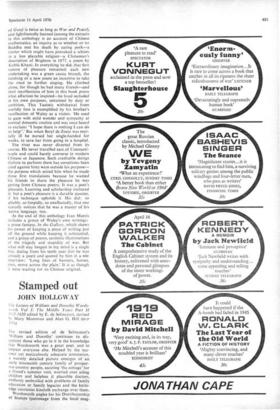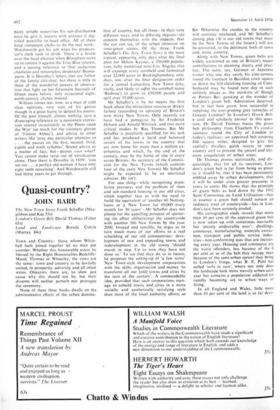Stamped out
JOHN HOLLOWAY
The Letters of William and Dorothy Words- itorth Vol 3: The Middle Years Part II 1812-1820 edited by E. de Selincourt, revised by Mary Moorman and Alan G. Hill (out' 115s) The revised edition of de Selincourt's 'William and Dorothy' continues to dis- appoint those who go to it in the knowledge that Wordsworth was a great poet, and to interest everyone else. Helped by the suc- cinct yet meticulously adequate annotation, a warmly detailed picture emerges of an early nineteenth century family of prosper- ous country people, securing 'the cottage' for a friend's summer visit, worried over ailing children and helpless if plausible doctors, endlessly embroiled with problems of family education or family legacies and the knife- edge courtesies kinsfolk exchange over them. Wordsworth angles for his Distributorship of Stamps (patronage from the local mag-
nate), crisply supervises his sub-distributors once he gets it, reports with anxious if dig- nified punctilio to head office. All of them keep competent clerks to do the real work: Wordsworth got his job when his predeces- sor's clerk took to drink. There is a bustle over the local election when Brougham turns up to contest it against the True-Blue interest, and a passing reference to 'that audacious charlatan and remorseless desperado' Buona- parte. It is Dorothy's letters that are fullest of the family chit-chat; but there is little in them of the wonderful powers of observa- tion that light up her Grasmere Journals of fifteen years before, only occasional eight- eenth-century clichés instead.
William comes out, now, as a man of cold clear opinions, very sure of his genius though in a great hurry to defend his poems. Of the poet himself, almost nothing, save a disparaging reference to 'a passionate expres- sion uttered incautiously in the Poem upon the Wye' (so much for the visionary glories of `Tintern Abbey'), and advice to other writers like 'pray pay particular attention to
. . the pauses on the first, second, third, eighth and ninth syllables'. Sound advice as a matter of fact, but—pauses over what? You cannot make verse out of versification alone. Then there is Dorothy in 1819: 'you see me ... a perfect old woman. I have only eight teeth remaining'. And Wordsworth still had thirty years to get through,







































 Previous page
Previous page